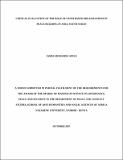| dc.description.abstract | Civil war has destroyed the infrastructure as well as disrupted the development of South Sudan as a country. Faith based organizations role in conflict resolution and peace building in South Sudan has been in existence for a long time. It has been playing a big role, together with other Civil Society Organizations (CSOs) in promoting peace in the country. The purpose of the study was to evaluate the role of faith based organizations in restoration of peace in Juba, South Sudan. The study was guided under the following objectives; to assess faith based organizations mechanisms in facilitating peace building in Juba, South Sudan, to explore the challenges faced by faith based organizations in peace building in Juba and to explore ways in which faith based organizations could strengthen their role in peace building in Juba, South Sudan. A descriptive survey research design was adopted. Simple random sampling was used to identify respondents from the three Faith Based Organizations operating in Jubek State. The three Faith Based Organizations for the study were African Leadership and Reconciliation Ministries, Women Aid Vision and South Sudan Council of Churches. The sample population in the study was 99 respondents’ qualitative data was collected. Data collected were analyzed using content analysis with the help of NVIVO and the results presented using graphs and in prose form respectively. From the results, the study found that the main causes of conflicts in Jubek State are; corruption, politics, land disputes and struggle for natural resources. The study also found that Faith Based Organizations play a role in bringing together the warring ethnic communities through conflict resolution mechanisms such as mediation, peace dialogue, and training of community leaders on peace and reconciliation. It was further revealed that the main challenges facing peace building activities by Faith Based Organizations are limited funding, lack of capacity building, limited access to conflict zones due to insecurity and political interference. The study found that by increasing training of pastors as agents of peace, advocate for equal treatment of all communities and conducting capacity building for their staff in peace and conflict management will strengthen their role in peace building. The study therefore concludes that with resources, Faith Based Organizations have the capacity to bring together the warring ethnic communities through conflict resolution mechanisms and conduct trauma counseling and healing workshops in the affected areas and forge ways of forgiveness. It is recommended that the government of South Sudan and other actors in the peace process should draw upon the goodwill and the wide networks of the Faith Based Organizations to promote the sustainability of the peace currently being pursued by Faith Based Organizations in most parts of Juba. The study also recommends that the donor community should support FBO activities towards peace building as it requires resources that are scarce in the region where there are conflicts. | en_US |

